Washington and London with a "Marshal Plan" for the Arab Spring
Ralitsa Kovacheva, May 27, 2011
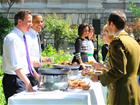 With the same ease as they were serving sausages at the garden party at Number 10, a few hours later David Cameron and Barack Obama were sketching the global agenda and the way they wanted to direct it. “We’ve been talking today about the two things we care about most: Getting our people jobs, and keeping our people safe,” the host said, British Prime Minister David Cameron. “Barack and I did not come into politics to cut public spending but neither did we seek office to see our great economies decline, or to land our children with unsustainable debts. That’s why by the second half of this decade, we’re making sure that debt ratios will be falling on both sides of the Atlantic.”
With the same ease as they were serving sausages at the garden party at Number 10, a few hours later David Cameron and Barack Obama were sketching the global agenda and the way they wanted to direct it. “We’ve been talking today about the two things we care about most: Getting our people jobs, and keeping our people safe,” the host said, British Prime Minister David Cameron. “Barack and I did not come into politics to cut public spending but neither did we seek office to see our great economies decline, or to land our children with unsustainable debts. That’s why by the second half of this decade, we’re making sure that debt ratios will be falling on both sides of the Atlantic.”
As to safety - the safety of British and American people is only possible by 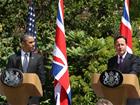 ensuring global security, because both countries have made major commitments to it. “If global politics is about spreading peace and prosperity, then this is a once-in-a-generation moment to grab hold of,” Mr Cameron said, highlighting three main challenges in this regard. First, to continue the destruction of terrorist networks. In this context he stressed the role of Pakistan as a closer ally, and keeping stability in Afghanistan in the light of the planned withdrawal of the international forces later this year.
ensuring global security, because both countries have made major commitments to it. “If global politics is about spreading peace and prosperity, then this is a once-in-a-generation moment to grab hold of,” Mr Cameron said, highlighting three main challenges in this regard. First, to continue the destruction of terrorist networks. In this context he stressed the role of Pakistan as a closer ally, and keeping stability in Afghanistan in the light of the planned withdrawal of the international forces later this year.
Second, the Arab-Israeli peace process has to be completed. David Cameron described Barack Obama's speech on the Middle East as “bold and visionary”. Several days ago, the US president proposed “ the borders of Israel and Palestine should be based on the 1967 lines with mutually agreed swaps”. The idea met a very negative reaction by Israel.
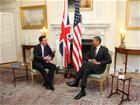 The third task, according to the British Prime Minister is “to help elevate the changes in North Africa and the Arab world – from a moment in history to a turning-point in history.” This was the strongest message of the two leaders, which they said would be brought up to the G8 summit in Deauville.
The third task, according to the British Prime Minister is “to help elevate the changes in North Africa and the Arab world – from a moment in history to a turning-point in history.” This was the strongest message of the two leaders, which they said would be brought up to the G8 summit in Deauville.
David Cameron: “Those people in Tahrir Square and Tripoli just want what we have – a job and a voice. And we all share in their success or failure. If they succeed, there is new hope for those living there and the hope of a better and safer world for all of us. But if they fail, if that hunger is denied, then some young people in that region will continue to listen to the poisonous narrative of extremism.”
Barack Obama: “As historic change unfolds across the Middle East and North Africa, we agree that the pursuit of self-determination must be driven by the peoples of the region and not imposed from the outside. But we are both committed to doing everything that we can to support peoples who reach for democracy and leaders who implement democratic reform. Tomorrow [26 May}, we’ll discuss with our G8 partners how those of us in the wider international community can best support nations that make the reforms necessary to build a framework for democracy, freedom, and prosperity for their people.”
The US President welcomed EU's decision to impose sanctions on Syrian President Bashar Assad, adding that the United States “are increasing pressure on him and his regime in order to end his policy of oppression and begin the change that people seek”. With respect to Libya the two leaders “agree that we should be turning up the heat”, but “we cannot put boots on the ground in Libya”.
David Cameron and Barack Obama repeatedly stressed the special and essential 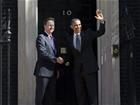 relationship between the two countries. And obviously, between them both personally, I thought while watching them serving sausages with their white shirts' sleeves rolled up. “That was probably the first time in history as we stood behind that BBQ that I could say a British PM was giving an American president a bit of a grilling,” David Cameron joked.
relationship between the two countries. And obviously, between them both personally, I thought while watching them serving sausages with their white shirts' sleeves rolled up. “That was probably the first time in history as we stood behind that BBQ that I could say a British PM was giving an American president a bit of a grilling,” David Cameron joked.
They were not just talking about the same things, but they did it literally in the same way. Because it's not just about diplomacy, history, military, economic and political power. It's about shared values. In his speech to British Parliament Barack Obama cited the words of Winston Churchill: “… Magna Carta, the Bill of Rights, Habeas Corpus, trial by jury, and English common law find their most famous expression in the American Declaration of Independence.”
“Being American or British is not about belonging to a certain group [ethnic or religious]; it’s about believing in a certain set of ideals - the rights of individuals, the rule of law,“ Mr Obama said. Commenting on the economic challenges the two countries are facing, he recalled Adam Smith's words: “There is no greater generator of wealth and innovation than a system of free enterprise that unleashes the full potential of individual men and women.“
As David Cameron said at the Davos forum in January, defending the liberal values as being the best ground for economic prosperity, “good ideas come through freedom – free thinking and the free association of like-minded people.”
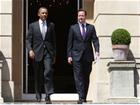 A day later Barack Obama and David Cameron went to Deauville (France), where the G8 summit has begun, with the Arab Spring among the main topics. As announced by the British Prime Minister, both will “push for a major programme of economic and political support for those countries seeking to reform.” More about the G8 summit you can read here.
A day later Barack Obama and David Cameron went to Deauville (France), where the G8 summit has begun, with the Arab Spring among the main topics. As announced by the British Prime Minister, both will “push for a major programme of economic and political support for those countries seeking to reform.” More about the G8 summit you can read here.
 | © © Presidency of the French Republic - C. Alix
| © © Presidency of the French Republic - C. Alix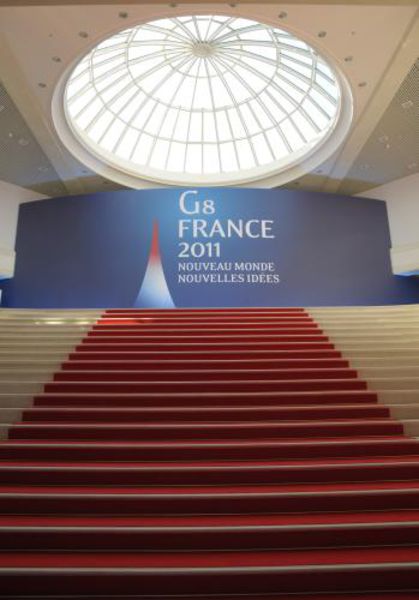 | © European Commission- Audiovisual Services
| © European Commission- Audiovisual Services  | © MAEE/Frédéric de La Mure
| © MAEE/Frédéric de La Mure